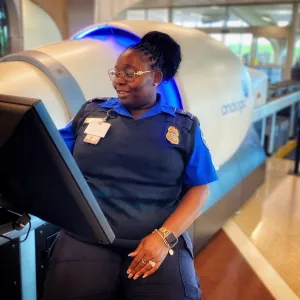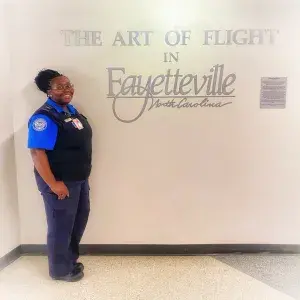
Rarely is anyone at North Carolina’s Fayetteville Regional Airport (FAY) asked to translate Haitian Creole at the checkpoint, but for Haitian-born TSA Officer Amilia Pierre, the invitation turned into an opportunity.
Cutting short her break, Pierre arrived at the checkpoint and met passenger Rose Darlene and her toddler, who were relocating to Chicago, Illinois, where a job interview waited for her. Because of a language barrier, Rose, a native of Haiti who spoke Creole, didn’t understand the guidance from the TSA officer at the front of the line on what items should be taken out of bags and placed in the bins.
Because of her daughter’s PediaSure®, a medically exempt liquid which the passenger should have removed from the bag for a quick and easy screening, her carry-on was flagged and rerouted for secondary screening. She didn’t understand why and was fearful of missing her flight.
Despite Pierre’s best efforts to explain the problem to Rose while expeditiously completing the screening, the doors to Rose’s flight closed before she and her daughter could board.
Pierre’s TSA duty was technically done, but her sense of personal obligation wasn’t.
“I moved to the U.S. from Haiti when I was 7 years old,” explained Pierre. “My culture and Christian faith taught me to take care of people and make them comfortable.”
Combine that learned behavior with the fact Pierre has a child of her own about the age of Rose’s
daughter, and you’ll understand why there was no question in her mind about what she would do.
“I translated for her with American Airlines. When the earliest flight to Chicago was out of Raleigh-Durham (RDU) the next day, I paid the transfer fee balance in order to get her on that flight,” said Pierre. “My husband is an Army E5 mechanic deployed to Poland, and I had the room, so I offered Rose a place to stay overnight.”
Rose declined the offer, something Pierre completely understood, saying, “I would have done the same thing.” Yet, the two remained in touch with Pierre traveling back to the airport that night armed with blankets and a momma bear desire to keep the two safe and comfortable on the secure side of the checkpoint.
TSA Officer Lucy Wolff heard about the mom’s plight and bought a gift card for Pierre to deliver, making sure the pair had food for the rest of the trip.
The next day, Pierre met Rose with breakfast on the public side where airport security had moved the pair in the early morning hours. After her eight-hour morning shift, Pierre drove the two 61 miles to RDU and prepared Rose for security screening at the Raleigh airport.
“TSA Officer Pierre set the bar on what it means to serve beyond any employment requirement,” said an appreciative FAY teammate Security Training Instructor Cathie Battle. “The rapid pace of security screening can be intense. It can ignite a less tolerant behavior or present a less caring atmosphere.”
Battle sees the opposite in her seasoned experience working at large and small airports, but concedes smaller airports have more time for a personal approach.
“I’ve worked more than a few checkpoints from Sacramento International Airport to RDU and am always pleased with the heart of our frontline. There’s doing the job and then there’s making a difference. Even in security, there’s an opportunity to be a force for good as Amilia was to Rose and her daughter.”
By Karen Robicheaux, TSA Strategic Communications and Public Affairs

